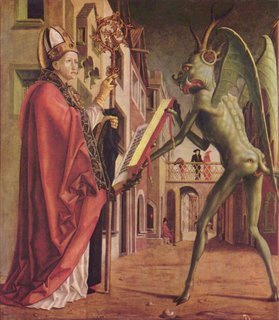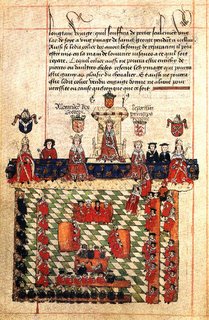 When politicians were real politicians: Emperor Henry IV begs the intercession of Countess Matilda of Tuscany and Abbot Hugh of Cluny
When politicians were real politicians: Emperor Henry IV begs the intercession of Countess Matilda of Tuscany and Abbot Hugh of Cluny.
I have to admit, I have become addicted to
Wonkette. Funny and unapologetically catty, it is the perfect medium in which to observe the Republican political class dissolve into a trembling puddle of ineffectual hypocrisy. It is much better that
dailykos or a number of other liberal (whatever that word means) blogs and websites, because although it is also obviously left-leaning, it follows the common path of the satirist and gossip: to leave no fool or hypocrite standing, regardless of affiliation. Kos and friends provide a valuable service by giving activists a common ground for uniting and bitching, and sometimes even bring important information into the political sphere. In the end, however, they are partisan in the most limited way, which is that they think political parties (in their case the Democratic party) can carry self-contained within themselves solutions to society's problems and that parties are about policies and ideologies, when really they are about naked power.
I don't mean to condemn anyone who is affiliated with the Democratic party or to say there aren't still honest idealists working within the party. Still, power is a mechanism that runs politics, and when you get together an institution whose goal is to obtain power, it's hard for it to be run for other motives. Ideology and policies are tools to achieve power, not the other way around. Even fanatical ideologues in power do not realize what really motivates them.
Corruption is not related to any ideology, it is related to unopposed power. That is really the reason people should vote Democratic next month. If the Republican party has really differentiated itself from the Democratic party, it is that all their best minds were working on politics, not policy. Their machine is well-oiled and both their base and their politicians are disciplined. Their president has received almost no opposition from congress even as his administration crafts a vision of executive power that is almost limitless. The one-party system of government, however, is beginning to show its cracks. Since a main part of their marketing was a Puritan approach to morality, the parade of scandals is especially glaring. The fact that Republicans always claim that they are the party of "personal responsibility" makes their lack of acknowledgement of their failings and their effort to throw blame in the oddest directions even more pathetic.
It will be interesting to see how much the GOP implodes. The juggling act of different forces in the party has had its tensions--how long can neo-con imperialists, plutocrats, theocratic populists, and fiscal conservatives really continue to believe they all have the same ideology? For a long time, the faithful voting patterns of the religious right has been a key, but the scandals have put their leaders into something of a quandary. James Dobson has tried to downplay the Foley scandal, but Tony Perkins (not the
cool Tony Perkins) after first blaming the "
culture of tolerance and diversity" (i.e., it's really the fault of people on the left), began to talk about a conspiracy of gay Republican staffers (an interesting parallel to the reaction of some conservative Catholics to the clerical pedophilia scandal -- it was not the result, they claimed, of too much power being concentrated in the hands of one group of people who protected their own, it was rather the "gay culture" encouraged in certain seminaries).
Although Mark Foley's behavior was not a result of his being gay, but of his being a creep protected by his colleagues, scapegoating homosexuals will be attractive to many on the far right -- that is, to a large portion of the Republican base. This may seal the 2008 campaign. There are two possibilities: 1) the Republicans nominate an extremist like Sam Brownback, incapable of beating whatever incompetent fool the Democrats nominate, or 2) John McCain's careful act of being a maverick (which he isn't, Bush got just about everything he wanted in his torture bill) to moderates and a conservative to the Republican base (visits to Jerry Fawell's Liberty University, etc.) will fall short of the expectations of the latter who may well support a third party candidate.
Anyway, I've gone on too long. Time to finish up so I can check the latest scandal on Wonkette.
 Today is the feast of St Wolfgang of Regensburg. That has little to do with what I plan to say, but the fifteenth-century painting of St Wolfgang and the devil by Michael Pacher is very cool.
Today is the feast of St Wolfgang of Regensburg. That has little to do with what I plan to say, but the fifteenth-century painting of St Wolfgang and the devil by Michael Pacher is very cool.




